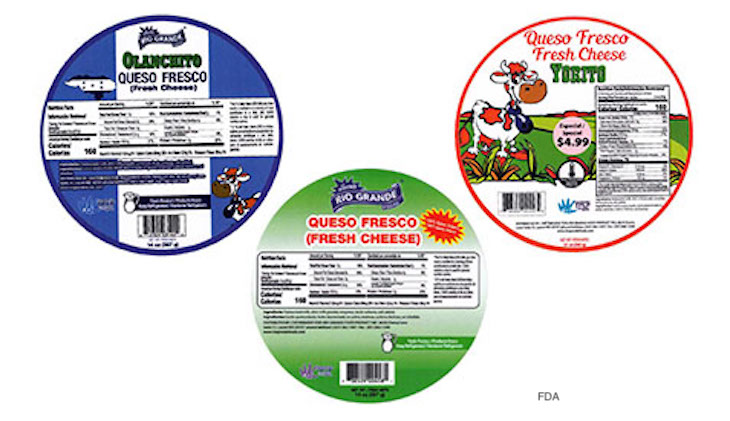The El Abuelito Listeria monocytogenes outbreak in 2021 is the subject of a Morbidity and Mortality Weekly Report (MMWR) from the CDC for the week of May 27, 2022. That outbreak sickened at least 13 people in four states. Twelve people were hospitalized and one person died.

The outbreak was linked to Hispanic-style cheese within 19 days of the detection of the illness cluster. Rapid food testing by agencies identified the implicated cheese.
PulseNet, the national molecular subtyping surveillance network that is coordinated by the CDC, found a cluster of three infections on January 19, 2021. Two of the patients lived in Maryland and one lived in Connecticut. All of the patients were of Hispanic ethnicity.
The cheese that was linked to this outbreak is a fresh, soft cheese made with pasteurized milk. This type of product is a well-documented source of listeriosis outbreaks. Unless stringent hygiene controls are implemented, these cheeses can be contaminated. The report states that public health agencies should establish or improve communications to emphasize the risk of eating these types of products, even when they are made with pasteurized milk.
The case count by state was Connecticut (1), Maryland (5), New York (4), and Virginia (3). The patient age range was from less than one year to 75 years. Four patients became ill during pregnancy, resulting in two pregnancy losses and one premature birth. Three patients who gave investigators information about their illnesses said they ate queso fresco, a fresh, soft cheese because they got sick. And among the eleven patients who completed a questionnaire, eight said they ate fresh, soft cheeses and seven ate queso fresco. Four patients said they ate brands of cheeses manufactured by El Abuelito.
The Connecticut Food Protection Program and Maryland Rapid Response Team collected samples of these types of cheeses at stores frequented by the patients. Sixty-one samples were tested. Two samples of El Abuelito cheese yielded Listeria monocytogenes bacteria that matched the outbreak strain. Whole genome sequencing confirmed that the cheese samples were closely related to the clinical isolates from patients.
A recall was issued on February 19, 2021. On February 26, 2021, the firm agreed to expand the recall to all types of Hispanic-style cheeses produced or handled in their facilities. That included queso fresco, requesón, and quesillo. El Abuelito ceased production, repackaging, and distribution of all products made at their facility.
A warning letter was sent to the firm in 2020 because during an unrelated Listeria monocytogenes outbreak, Listeria grayi and Listeria innocua, which are typically nonpathogenic, were found in El Abuelito’s processing areas. The presence of those species indicated that Listeria monocytogenes could survive in that environment.
Symptoms of listeriosis, the illness caused by this pathogen, typically include a high fever, stiff neck, and severe headache, often preceded by nausea and diarrhea. Pregnant women can suffer miscarriage and stillbirth if they contract this infection, even though they may think they only have a mild case of the flu. If you ate these cheeses and were ill, you may have been part of this El Abuelito Listeria monocytogenes outbreak.

If you or a family member have been sickened with a Listeria monocytogenes infection after eating recalled El Abuelito soft fresh cheeses, please contact our experienced attorneys for help at 1-888-377-8900 or text us at 612-261-0856. Our firm represents clients in lawsuits against grocery stores and food processors, and families in wrongful death cases.




